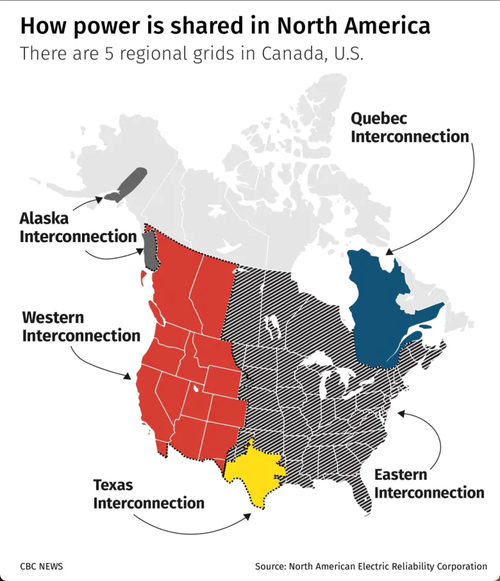This article was originally published by Tyler Durden at ZeroHedge.
The US heating season has officially begun, and new warnings show that a quarter of all Americans could experience energy emergencies this winter if temperatures fall below average due to tight fossil fuel supplies.
Power grids from the Great Lakes to Louisiana, New England, Carolinas, and all of Texas are the most at risk for power supply shortfalls during high-demand periods, according to Bloomberg, citing a new report from the North American Electric Reliability Corporation (NERC), a regulatory body that manages grid stability.
NERC said a cold snap for an extended period could spark grid strain due to soaring power demand from households and businesses. This would cause supplies of natural gas, coal, and backup diesel generators to draw down more quickly and possibly experience shortages.
“The trend is we see more areas at risk, we see more retirements of critical generation, fuel challenges and we are doing everything we can.
“These challenges don’t kind of appear out of nowhere,” John Moura, NERC’s director of reliability assessment, said during a media briefing.
For instance, the demand for diesel is rising, but East Coast supplies are at record lows for this time of year. Shortage of fuel used to power the economy, from heating to trucking, has about 25 days left of supplies in storage. Any supply disruption could leave power generation plants with supply gaps this winter.
Jim Matheson, chief executive officer of the National Rural Electric Cooperative Association, told Bloomberg that electricity demand is set to outpace “available supply during peak winter conditions, consumers face an inconceivable but real threat of rolling blackouts.”
Matheson warned: “It doesn’t have to be this way. But absent a shift in state and federal energy policy, this is a reality we will face for years to come.”
NERC’s warning about unstable grids covers about a quarter of the US population. The average household is expected to pay 47% more for electricity than a year ago — and there are at least 20 million households behind on utility bills.
The tightest power supplies are expected to be in the central US, managed by the Midcontinent Independent System Operator due to a large number of generators shut last winter and Gulf Coast power plants aren’t shielded against cold snaps. Then there’s New England, which consists of six states in the US Northeast, Connecticut, Maine, Massachusetts, New Hampshire, Rhode Island, and Vermont, which faces NatGas shortfalls due to inadequate pipeline infrastructure.
“There is a very real possibility that New England could be facing a dire set of consequences this winter,” James Danly, a commissioner on the Federal Energy Regulatory Commission, warned Thursday.
Rapid decarbonization of the electricity sector is one of the main reasons America’s power grid is less reliable than ever before. Solar and wind are inconsistent, as Europe found out last winter, which only paves the path for a nuclear future.













Comments